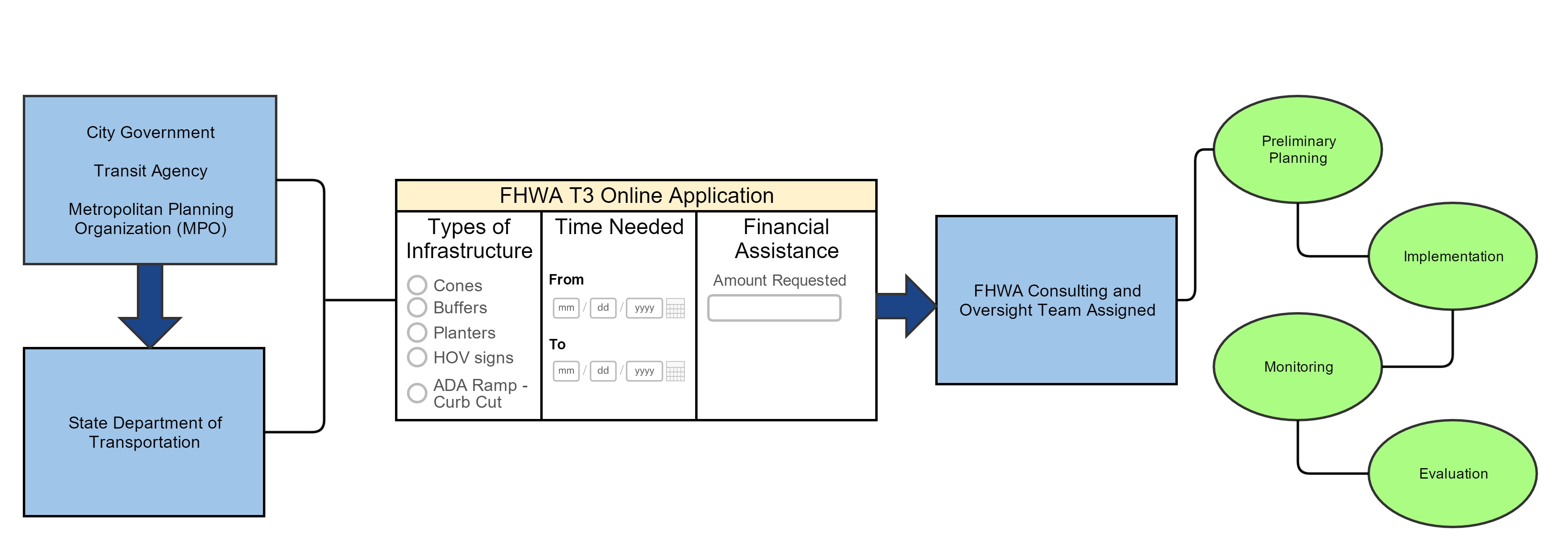Editor’s Note: In the coming weeks we will be following up on our Policy Summit with a series of articles by the panelists, speakers, and Great Upheaval contestants. The below is an article by the winner of our Great Upheaval competition, Elizabeth Bastian. She worked with a team of 7 others to come up with their pitch: The Tactical Transportation Toolkit. This is her pitch.
When it comes to transportation problems and solutions in America, the focus often remains on the dense urban agglomerations – New York, San Francisco, LA, Chicago, etc. But what about the smaller towns and metropolitan suburbs, where the majority of Americans live? Because of decades of investment in infrastructure catering to automobiles, these micro-urban environments are suffering both in an economic and in a public health sense. As the Main Streets of America, the downtown economic corridors, have transformed into highways, cars are often the only viable option for everyday transportation.

The T3 Team. Clockwise, starting from left: Shuake Wuzhati, Mariane Shen Yin Lin, Lori Morgan, Evan Alvarez, Elizabeth Bastian, Emily Weimer, Marcia Klopf, Munguntuya Otgonjargal
Sadly, a return to the epoch that inspired William P. Eno’s original Rules of the Road, in which pedestrians, cyclists, and motorists interacted together safely and efficiently on the streets, lacks a sense of feasibility. Finding both the interest and funds to carry out complete streets initiatives is an extreme challenge for MPO’s and local transit/planning agencies in smaller communities – the places that don’t have access to the Ubers and Lyfts of the world. And while the policies and guidelines, as well as the proof of concept and evidence of success, for implementing local multimodalism initiatives already exist, the continued rhetoric, lobbying, and release of publications is clearly not enough.
To remedy this, we propose the creation of a tactical transportation toolkit – T3.
This toolkit would accompany the aforementioned design guidelines and best-practice publications as a tangible, practical, flexible, temporary, and affordable solution for MPO’s and city governments/transit agencies to utilize. By renting small pieces of infrastructure for a specified amount of time – no less than 30 days, no more than one year – these smaller urban areas can have the opportunity to experiment with transportation solutions that are often unavailable or resisted.
Some example pieces include:
- Cones/other buffer materials to create temporary bike lanes, widen sidewalks, create new public spaces
- Street signage (Bike Route, Ped Crossing, Yield, etc.)
- Temporary sharrows, HOV lanes
- Shelters and seating for bus stops
- ADA-compliant ramps for curb cuts and driveways
Who administers it?
As the Federal Highway Administration, or FHWA, already has existing guidelines, best practices, etc., on complete streets planning, we feel they would be the best existing branch of the federal DOT to adequately administer this kind of toolkit. The online application for the T3 would be hosted on the organization’s website. The application would consist of three main parts: types of infrastructure requested, time needed, and if any financial assistance was necessary to implement the toolkit. Though each applicant may need more expert knowledge than financial assistance, we are hoping that there will some kind of discretionary grant program that will accompany the T3 application so that both kinds of assistance can be provided.

In order for the toolkit be successful, there would have to be dedicated staff and funding to facilitate the distribution of T3. There would also be a designated consulting and oversight team, either as part of the FWHA or contracted out, that would work with the local or regional transit/planning agency to ensure correct and successful implementation. The consulting team would walk both the applicants and community members through education initiatives during preliminary planning, as well as data collection and analysis throughout the implementation period.
Who can apply?
Any city government, MPO, or transit agency can apply. However, because of the various agencies that control certain roads, and to ensure cooperation and open communication across levels of governance, the state DOT would have to sign off on the application and eventual implementation plan. Hopefully, both local/regional and state governmental agencies could collaborate on the application, implementation, and evaluation.
Next Steps
After winning first place in The Great Upheaval competition at the 2015 Eno Center for Transportation Policy Summit with the T3, our team hopes to work towards making the toolkit a reality. We firmly believe that smaller American communities should have the same flexibility and access to affordable transportation solutions that large urban areas have. The T3 can provide these in a way that is practical, but fun. The T3 allows cities to show, not just tell, their residents how much multimodalism can improve their quality of life, and does so in a way that is accessible and affordable.





